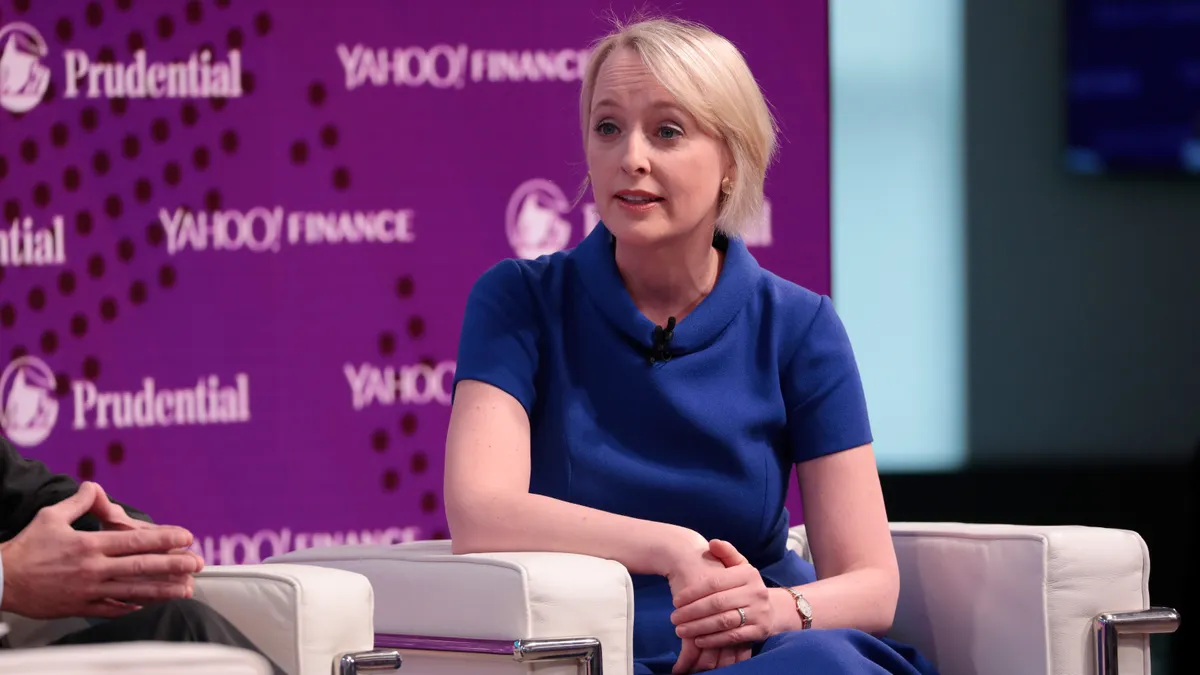Taking a rest from the corporate world can be professionally clarifying. Jasmine Singh learned this after leaving a career as a commercial litigator at a large law firm to take a year working as an instructor in the fitness industry.
“That Peloton behind me is not just a towel hanger,” she quipped on a recent video call with Legal Dive. Singh’s need for a sharp break to attend to her health helped prioritize goals, she said, demonstrating the importance of choosing work that aligns with one’s personal passions in life.
Singh, a former general counsel at software firm Binti and deputy general counsel at Patreon, joined contract management software company Ironclad in November, where she leads a six-person legal team. She offers potential customers her experiences introducing CLM software into a legal department, having been involved with four implementation cycles prior to joining Ironclad.
Editor’s note: This interview has been edited for clarity and brevity.
LEGAL DIVE: What are some of your near-term priorities as Ironclad’s GC?

JASMINE SINGH: The first priority is my team, making sure we’re buttoned up internally from a compliance, risk, regulatory, legal perspective, and to make sure we’re supporting the business in properly mitigating risk and also maximizing value by way of our contracts. Another major priority is in making sure we’re building products that actually serve lawyers and our customer base in the best way possible. So [that means] having my team be beta testers for all the features that we roll out.
It sounds like you want to become an Ironclad power user?
The other day I asked my legal ops person to assign me an NDA in Ironclad for review, because I wanted to know how the process of assignment worked, how the AI tools in the system were going to work, how the approvals were routed, what messages I was going to get about signature -- all of that stuff. So, yes, absolutely, I view everybody on my team as having to use the product, myself included.
Your job isn’t just legal work but also talking with customers and potential customers, helping to push products?
Yeah, and it’s actually been really fun for me. The reason I talk to them is because I now have done this four times, and I have made so many mistakes. I’ve also done some things right, but I’ve also done some things wrong. And so it’s nice for me to go to other CLOs or GCs and say, ‘Hey, when I implemented it this way, it didn’t really work for me. So, if you’re thinking about that, here’s the lesson I learned.’
What was your practice as a litigator and what made you switch to the in-house counsel world?
I did primarily complex commercial litigation. It really spanned the gamut: commercial disputes, professional negligence, bankruptcy. I did trade secrets misappropriation. Honestly, if somebody was arguing about something, I was involved in it. The transition in-house for me was a really unique story, partially because I did find myself in law firms burning out. I was having a hard time finding my professional footing in firms where I felt misaligned between what I was doing in my personal life and what I was doing in my professional life. I was always experiencing this tension. So my path in-house was not a straightforward one.
Honestly, if somebody was arguing about something, I was involved in it.

Jasmine Singh
Ironclad General Counsel
I took a break, and it was a pretty sharp break. I stopped practicing law, and I became a spin instructor for about a year, and it was really important for me, in telling my story, to not lose sight of how valuable my spin instructor days were. It was the place where I really homed in on my desire to make sure I stay mission-aligned in the work that I do. I have to care a lot about the work. My personal and professional mission have to match up. I also have to be really excited about the people that I'm working with. And so when I was going in-house, I was eager to make sure I was finding companies that I was mission-aligned with, and where I felt like I could be myself and really talk about the fact that I had all these other interests outside of practicing law that I wanted to pursue.
What advice would you have for someone at a firm pondering a move in-house? Any tips or strategies for that transition?
I think doing as many informational interviews with people in-house as possible is important to understand what the day-to-day of the work is, especially if you come from a larger firm environment where there’s a very clear division of labor. In-house departments just don’t work like that. You’ve got to do a lot of stuff that you’re not really comfortable doing. You’ve got to figure out problems that maybe you don’t know the answers to. You have to be business-minded and focused on the company’s objectives. For anybody that’s considering the transition, make sure you’re talking to people in-house, because you don't want to set yourself up for this situation where you’re like, ‘Oh, I just made a mistake.’
For example, where are the two assistants like I had at my old firm?
It’s not just going to be that. Once you make the decision, there’s a multiple-fold approach. Knowing your story, being able to explain how and why you would be an asset in-house, no matter what practice group you’re coming from, and leveraging your network to connect with people that are in industries or in companies where you might want to move in. Because I think it makes a difference in trying to find jobs that are good for you, not just any in-house job.
How do you think about the optimal size of your team versus what legal work should be done outside, and balancing your external spend with seeking more budget for a larger team?
What’s really cool about this is I can use Ironclad to inform this analysis. If I know how many contracts each of my commercial lawyers is reviewing and what their quarter-over-quarter increase is, then I know my sales team’s pipeline of contracts that are going to come in in the next quarter. I can then abstract out that, this time next year, I’m going to have two times the contracts. And unless I have some kind of scale plan built into my tools, like more self-service on the contracts, I’m going to need to incrementally increase my head count by X amount or X percent. So I really think about where is the business headed, and how does that influence how I’m thinking about my own resourcing needs. Sometimes it’s additional head count, but not all the time.
Do you use outside firms?
We typically will use outside counsel where we require specialized support on a nuanced legal issue. So if I don't have in-house expertise on something, or there is something that’s more highly regulated, where you really want someone who has done this hundreds of times, that is the moment where we'll go to outside counsel and say, ‘Hey, you’ve done this probably for a lot more companies. Can you tell us what you’re seeing in the market, and how should we think about this, and what the risk really is?’
Is the lawyer inflation we hear so much about moderating?
Law firms get a bad rap sometimes, like all they want to do is increase hours. I think there are ways in-house lawyers can keep hours down. We need to scope out our request, and say, ‘I need you to do this specific project for me and I’ve only got this much to spend. Can you do it?’ Sometimes I’ve had outside counsel say, ‘No, I can't do it for that amount because blah, blah, blah.’ And then it’s my choice to make. How badly do I need that advice from that firm, knowing my risk-reward on what the analysis is?
If you’re a GC thinking about risk across your company, and more legal work from your department and firms are processed with AI, does your comfort level increase or decrease?
There should always be a human in the review loop. The AI tool is only as good as the human that is using it and the human that is reviewing the output. If, for example, there is work product that is hallucinated and is citing cases that don’t exist, or citing holdings that aren’t accurate, a person still has to review those things and make sure that what the AI produced is accurate and complete and can and should be submitted. And if not, it's up to them to revise it. I think that the real risk lies in making sure that people are not assuming that the AI alone is the end-all, be-all. You hear sometimes, ‘Well, can't AI just do what the lawyer does?’ It can’t, but the AI can make the lawyer’s job easier and make their day go a lot more seamlessly.
Do you think legal documents in general will improve as AI tools are more refined?
People will get better at using AI, and that will help the work product get better. AI is going to help people practice law in a way that is better. And by that I mean people won't spend as much time and effort on rote, repeatable work. They’re going to be able to spend it doing version 1s with AI, and then doing the next level of work, which is, is this right? Is this accurate? And being creative as a practicing lawyer. I can tell you, sometimes the hardest part of my job is just getting something on a piece of paper. And sometimes all I want is to be given a piece of paper that I can mark up. It has really been a differentiating factor. I was a solo GC for a short amount of time and doing everything myself. Sometimes I just wanted a tool to use that could generate a first draft, and then I could work off of that.
That leads to the question: Will there be fewer jobs for lawyers in 20 years than we have today?
I don’t think there will be fewer jobs. I think there will be different jobs. Lawyers will continue to use AI to move the profession in a forward direction and be doing less of the administrative work, less of the repeatable tasks. They’ll continue to do the forward-thinking work and they'll have to spend less time doing it. Lawyers still work really long hours. And I think that AI is not going to eliminate more work altogether. It’s just going to help them work fewer hours and really focus those hours on the work that they think is the most interesting.



















